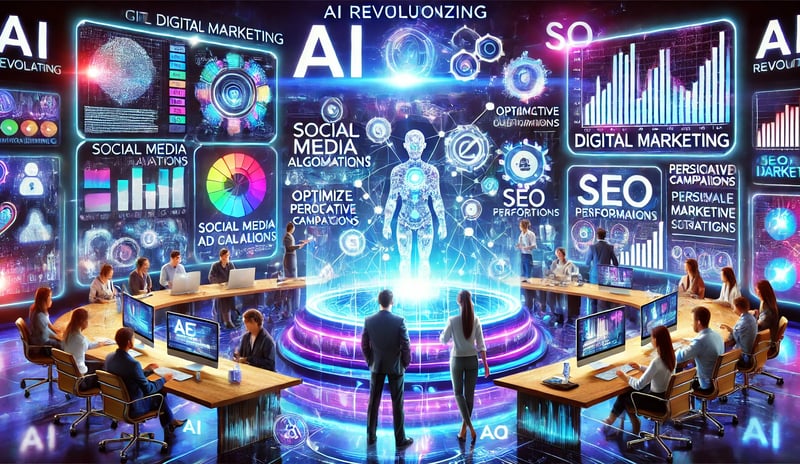Revolutionizing Digital Marketing with AI: A Comprehensive Guide
Discover how AI is revolutionizing digital marketing through advanced personalization, predictive analytics, and intelligent content strategies. Explore the future of marketing technology.
AI IN DIGITAL MARKETING
2/6/20252 min read


Introduction: The AI-Powered Marketing Transformation
In the dynamic world of digital marketing, artificial intelligence (AI) has emerged as a game-changing technology that is reshaping how businesses connect with their audiences, optimize their strategies, and drive meaningful engagement. This comprehensive guide explores the profound impact of AI on digital marketing, offering insights into how cutting-edge technologies are redefining the marketing landscape.
The AI Marketing Ecosystem: Key Technological Innovations
1. Personalization at Scale
AI has transformed personalization from a marketing buzzword to a sophisticated, data-driven strategy:
Hyper-Targeted Content: Machine learning algorithms analyze user behavior, preferences, and interaction history to create individually tailored content experiences.
Dynamic Customer Segmentation: AI can identify nuanced customer segments that go beyond traditional demographic categories, enabling more precise marketing approaches.
Real-Time Personalization: Websites and marketing platforms can now adapt in real-time, presenting users with content, products, and recommendations that match their exact moment-to-moment interests.
2. Intelligent Content Creation and Optimization
The content creation process has been revolutionized by AI technologies:
Automated Content Generation: Advanced natural language processing (NLP) tools can create draft content, social media posts, and marketing copy.
Content Performance Prediction: AI algorithms can now predict the potential success of content before publication, helping marketers make data-driven decisions.
SEO Optimization: Machine learning tools provide deep insights into keyword strategies, content structure, and search intent.
3. Predictive Analytics and Customer Insights
AI-driven analytics have transformed how businesses understand and predict customer behavior:
Predictive Customer Behavior Modeling: Advanced algorithms can forecast customer actions, potential churn, and lifetime value with unprecedented accuracy.
Sentiment Analysis: AI tools can analyze customer feedback, social media mentions, and interactions to provide real-time insights into brand perception.
Competitive Intelligence: Machine learning can track and analyze competitor strategies, helping businesses stay ahead of market trends.
AI-Powered Marketing Channels
Social Media Marketing
Intelligent Content Scheduling: AI determines the optimal times to post content for maximum engagement
Automated Community Management: Chatbots and AI assistants handle customer interactions and initial support queries
Influencer Identification: Machine learning algorithms identify the most relevant influencers for specific marketing campaigns
Email Marketing Reinvented
Predictive Subject Line Optimization: AI generates and tests subject lines for maximum open rates
Send Time Optimization: Algorithms determine the best time to send emails for individual recipients
Dynamic Content Personalization: Emails that adapt in real-time based on user data and behavior
Advertising Transformation
Programmatic Advertising: AI-driven platforms that automate ad buying, placement, and optimization
Advanced Audience Targeting: Machine learning creates incredibly precise audience segments
Creative Optimization: AI tools that can generate and test multiple ad variations
Ethical Considerations and Challenges
While AI offers tremendous potential, businesses must navigate several critical considerations:
Data Privacy: Ensuring transparent and responsible use of customer data
Algorithmic Bias: Implementing safeguards against unintended discriminatory practices
Human Oversight: Maintaining a balance between AI automation and human creativity
Continuous Learning: Developing strategies for ongoing AI skill development
Implementation Strategies for Businesses
Step-by-Step AI Marketing Integration
Assess Current Capabilities: Understand your existing marketing technology stack
Start with Pilot Projects: Begin with targeted AI implementations
Invest in Data Quality: Ensure robust, clean, and comprehensive data sources
Build AI Literacy: Train marketing teams to work alongside AI technologies
Iterate and Optimize: Continuously refine AI strategies based on performance metrics
Emerging Trends and Future Outlook
Anticipated Developments
Conversational AI: More sophisticated chatbots and virtual assistants
Augmented Reality Marketing: AI-powered immersive marketing experiences
Voice Search Optimization: Advanced AI technologies for voice-based marketing strategies
Predictive Customer Journey Mapping: More accurate prediction of customer interactions and touchpoints
Conclusion: Embracing the AI Marketing Revolution
Artificial intelligence is not just a technological trend—it's a fundamental reimagining of digital marketing. By embracing AI strategically, businesses can:
Create more meaningful customer connections
Optimize marketing spend
Drive unprecedented levels of personalization
Gain competitive advantages in an increasingly digital marketplace
Are You Ready to Transform Your Marketing?
The AI revolution in marketing is here. The question is not whether to adopt AI, but how quickly and effectively you can integrate these transformative technologies into your marketing strategy.
